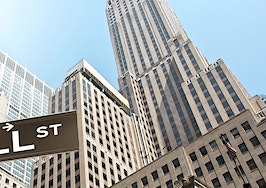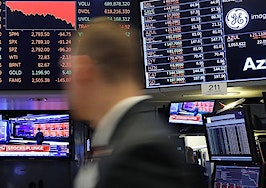A rollercoaster month on Wall Street has left traders with losses — and, probably, whiplash — but likely won’t lead to the implosion of the housing market unless there are some other calamitous political or economic surprises.
The stock market’s beating has been ongoing for months and culminated Monday with the worst Christmas Eve trading session in Wall Street history. However, shares bounced back Wednesday, erasing Monday’s losses but still leaving markets down compared to a month ago.

Tendayi Kapfidze
Tendayi Kapfidze, chief economist at LendingTree, told Inman Wednesday that plunges like the one that happened Monday can impact broader sectors of the economy by diminishing the confidence of consumers and investors. But he also said that most people buying houses “are making lifestyle-type decisions, and they’re making them long term.” That means wild swings in the stock market don’t translate directly into real estate.
“The short-term flux, they can maybe look past that,” he added.
Ken Jenny, CEO of real estate and tech consulting firm tranCen.com, referred to this concept as “real houses for real people” and pointed out that many middle class homebuyers aren’t heavily invested in the stock market.
“The people that need housing, the $250,000 and the $350,000 houses, they’re more concerned about their job,” he told Inman. “That makes up the bulk of real estate sales.”
Both Kapfidze and Jenny agreed that the fundamental condition of the economy remains in overall good shape. Moreover, Jenny believes that there is “still an undersupply” of new homes, meaning prices should stay strong, and that interest rates remain near their historic lows, which benefits buyers. And Kapfidze described the recent stock selloffs as “overdone,” adding that continued volatility could ultimately help reverse recent interest rate increases.
“If they come back down that’s going to be helpful for mortgage finance,” he continued. “That might reverse some of the impact on the housing market that we’ve seen this last year.”
So that’s all good news! Case closed, right?
Unfortunately, no.

Ken Jenny
For one thing, a flailing stock market can affect certain niches of the real estate industry, according to the experts who spoke with Inman for this story. For example, higher end buyers — who are more likely to have lost money on Wall Street — may not have the cash for additional luxury homes.
“I think it’s going to impact what I call the ‘nice to have’ housing market,” Jenny said. “Which is houses two, three and four.”
And while second or third homes may not make up the majority of the U.S. housing market, a dip in demand for those properties could have significant impacts on specific regions or brokerages.

Aaron Terrazas
The housing market also has troubles of its own that aren’t directly related to the stock market. Zillow senior economist Aaron Terrazas said that while stock market volatility has “rattled nerves,” it’s still “a very long and tenuous stretch from the stock market to the housing market and the rest of the real economy.”
“There are much bigger, more fundamental forces driving the recent softness in home sales we’ve seen recently,” Terrazas told Inman, pointing to interest rates and the challenges of saving for a down payment.
Investors thinking of taking their money off Wall Street and putting it in real estate — traditionally a safer and more stable bet — might also think twice now as they “realize that above-market gains are no longer guaranteed,” Terrazas added.
All of which is to say that both the housing and stock markets face challenges going into 2019, which Terrazas described as having an “increasingly cloudy macroeconomic outlook.”
Finally, that cloudiness is further exacerbated by the current political climate. Though Kapfidze did not mention President Trump by name, he did point to both trade and the current government shutdown and said the “shaky parts of the economy are all the more political parts.” He also said that while markets usually recover after shutdowns, this one “seems a little more problematic” and could have longer-lasting impacts if it drags on for an extended period of time.
That’s something that currently seems possible given lawmakers’ impasse, and it introduces a wild card into both the real estate and stock markets.
“I think that next year, there’s going to be a lot of market volatility that is politically driven,” Kapfidze added.













